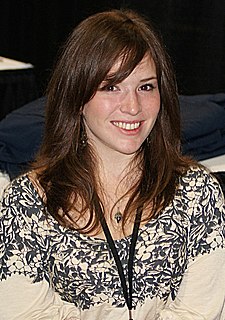A Quote by Michael Scott
That is as true for fiction or non-fiction. The writer has to really know their subject. It is really important to remember that the readers are a lot smarter than the writer. Also, good writing has to do with rewriting. You will never get it right the first time. So you rewrite and rewrite again until you get it right. Until you, and the reader, will be able to visualize what you're writing about.
Related Quotes
Good writing is writing and rewriting and rewriting and rewriting. Sometimes, it happens to work right away, and that's amazing. But most of the time, it happens to work, and then you rewrite and rewrite and rewrite, and maybe it even comes back to the thing it was in the first place, but then you know for sure that it is good, and it's what you wanted to do.
No one can teach writing, but classes may stimulate the urge to write. If you are born a writer, you will inevitably and helplessly write. A born writer has self-knowledge. Read, read, read. And if you are a fiction writer, don't confine yourself to reading fiction. Every writer is first a wide reader.
No one can teach writing, but classes may stimulate the urge to write. If you are born a writer, you will inevitably and helplessly write. A born writer has self-knowledge. Read, read, read. And if you are a fiction writer, dont confine yourself to reading fiction. Every writer is first a wide reader.
I dislike that premise implies that a fiction writer is incapable of dreaming up stories that can bring readers to tears, that if you are lucky enough to be living a pretty sedate life ,as I am, you've got nothing worthy of writing about, that you're incapable of making a reader's gut wrench.Frankly, that's what makes readers nervous, the sorcery of you or me or any good fiction writer making up characters who feel like real people, of telling a story that feels true but isn't.
When you first start writing-and I think it's true for a lot of beginning writers-you're scared to death that if you don't get that sentence right that minute it's never going to show up again. And it isn't. But it doesn't matter-another one will, and it'll probably be better. And I don't mind writing badly for a couple of days because I know I can fix it-and fix it again and again and again, and it will be better.
The most difficult part of writing a book is not devising a plot which will captivate the reader. It's not developing characters the reader will have strong feelings for or against. It is not finding a setting which will take the reader to a place he or she as never been. It is not the research, whether in fiction or non-fiction. The most difficult task facing a writer is to find the voice in which to tell the story.
A couple of pieces of advice for the kids who are serious about writing are: first of all, to read everything you can get your hands on so you can become familiar with different forms of writing: fiction, non-fiction, poetry, journalism. That's very important. And also keep a journal. Not so much, because it's good writing practice. Although it is, but more because it's a wonderful source of story starters.
Good writing is good writing. In many ways, it’s the audience and their expectations that define a genre. A reader of literary fiction expects the writing to illuminate the human condition, some aspect of our world and our role in it. A reader of genre fiction likes that, too, as long as it doesn’t get in the way of the story.
How often I have tried to tell writing students that the first thing a writer must do is love the reader and wish the reader well. The writer must trust the reader to be at least as intelligent as he is. Only in such well wishing and trust, only when the writer feels he is writing a letter to a good friend, only then will the magic happen.





































